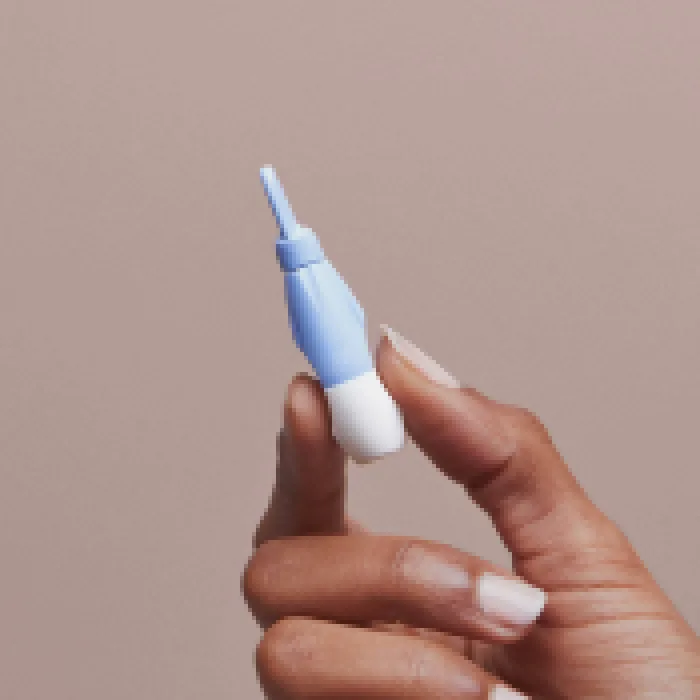Here's what we'll cover
Here's what we'll cover
Many people associate the hormone testosterone with male fertility. But what happens when you have normal or high testosterone levels, and your sperm count is still low? Many different factors play into sperm health, not just testosterone levels. If you recently found out you have high testosterone levels but a low sperm count, we’ve covered everything you need to know about what that means for you and your fertility.
Does taking testosterone make you infertile?
Testosterone is a sex hormone made by the testicles. Normal testosterone levels are important for fertility since testosterone is involved in sperm production, sperm health, and erectile function, but too much may make you infertile.
It seems logical to think that, since testosterone contributes to fertility, more testosterone will make you more fertile. But it’s possible to have too much of a good thing. When testosterone levels get too high (like in people receiving testosterone shots), the high levels actually work like male birth control and stop sperm production (Patel, 2019; Amory, 1998).
A WHO (World Health Organization) task force found that men with normal sperm counts who took testosterone developed a condition called azoospermia, or semen without sperm (WHO, 1990). One small study found that 88% of men taking testosterone supplements for infertility developed azoospermia, but when they stopped the testosterone therapy, 65% saw their sperm production recover (Samplaski, 2014).
What does testosterone do to your body?
That’s not to say that all testosterone is bad. It’s only a problem when there’s too much or too little of it. Testosterone has many important effects on the body, including (Nassar, 2022):
Makes the penis and testes grow during puberty
Stimulates sperm production (spermatogenesis)
Increases sex drive (libido)
Deepens the voice
Helps produce erections
Stimulates facial hair and body hair growth
Increases muscle mass
Stimulates bone growth
Increases red blood cell number
Does low testosterone cause infertility?
Low testosterone levels (hypogonadism) are linked to infertility. Having low testosterone may lead to (Sizar, 2021; Grinspon, 2020):
Low sperm count
Low libido
Weight gain
Depression
Anemia
Unlike people with normal testosterone levels, people with hypogonadism may benefit from testosterone replacement therapy because their testosterone levels are low (Schmidtova, 2009).
“My husband takes testosterone injections—can I still get pregnant?”
If your male partner uses testosterone injections, it may affect his sperm count. Testosterone decreases sperm count, and the injectable form has a stronger effect and higher risk of side effects than oral supplements (Crosnoe, 2013). This can make it more difficult to get pregnant. However, it only takes one sperm to fertilize an egg, so a lower sperm count doesn’t necessarily mean you won’t get pregnant.
If you and your partner haven’t been able to conceive while he has been taking testosterone injections, there are other treatment options to consider. There are assisted reproductive technology methods that can extract sperm directly from the testes (testicular sperm extraction, or TESE) even if it isn’t present in the ejaculate. Intrauterine insemination, ICSI (intracytoplasmic sperm injection), and IVF (in vitro fertilization) can allow fertilization to happen even with fewer sperm.
Speaking to a healthcare provider or fertility specialist is a good first step if you have any questions about fertility.
DISCLAIMER
If you have any medical questions or concerns, please talk to your healthcare provider. The articles on Health Guide are underpinned by peer-reviewed research and information drawn from medical societies and governmental agencies. However, they are not a substitute for professional medical advice, diagnosis, or treatment.
Amory, J. K. & Bremner, W. J. (1998). The use of testosterone as a male contraceptive. Bailliere's Clinical Endocrinology and Metabolism, 12 (3), 471–484. doi:10.1016/s0950-351x(98)80229-2. Retrieved from https://pubmed.ncbi.nlm.nih.gov/10332567/
Crosnoe, L. E., Grober, E., Ohl, D., et al. (2013). Exogenous testosterone: a preventable cause of male infertility. Translational Andrology and Urology , 2 (2), 106–113. doi:10.3978/j.issn.2223-4683.2013.06.01. Retrieved from https://www.ncbi.nlm.nih.gov/pmc/articles/PMC4708215/
Grinspon, R. P., Bergadá, I., & Rey, R. A. (2020). Male hypogonadism and disorders of sex development. Frontiers in Endocrinology , 11 , 211. doi:10.3389/fendo.2020.00211. Retrieved from https://www.ncbi.nlm.nih.gov/pmc/articles/PMC7174651/
Nassar, G. N. & Leslie, S. W. (2022). Physiology, testosterone. StatPearls . Retrieved on June 7, 2022 from https://www.ncbi.nlm.nih.gov/books/NBK526128/
Patel, A. S., Leong, J. Y., Ramos, L., et al. (2019). Testosterone is a contraceptive and should not be used in men who desire fertility. The World Journal of Men's Health , 37 (1), 45–54. doi.:10.5534/wjmh.180036. Retrieved from https://www.ncbi.nlm.nih.gov/pmc/articles/PMC6305868/
Ruth, K. S., Day, F. R., Tyrrell, J., et al. (2020). Using human genetics to understand the disease impacts of testosterone in men and women. Nature Medicine , 26 (2), 252–258. doi:10.1038/s41591-020-0751-5. Retrieved from https://www.nature.com/articles/s41591-020-0751-5
Samplaski, M. K., Loai, Y., Wong, K., et al. (2014). Testosterone use in the male infertility population: prescribing patterns and effects on semen and hormonal parameters. Fertility and Sterility , 101 (1), 64–69. doi:10.1016/j.fertnstert.2013.09.003. Retrieved from https://www.fertstert.org/article/S0015-0282(13)03053-7/fulltext
Schmidtova, E., Kelemenova, S., & Ostatnikova, D. (2009). Testosterone supplementation therapy as a treatment of hypogonadism. Bratislavske Lekarske Listy, 110 (12), 765–772. Retrieved from https://pubmed.ncbi.nlm.nih.gov/20196470/
Sizar, O. & Schwartz, J. (2021). Hypogonadism. StatPearls . Retrieved on June 7, 2022 from https://www.ncbi.nlm.nih.gov/books/NBK532933/
Travison, T. G., Vesper, H. W., Orwoll, E., et al. (2017). Harmonized reference ranges for circulating testosterone levels in men of four cohort studies in the United States and Europe. The Journal of Clinical Endocrinology and Metabolism , 102 (4), 1161–1173. doi.org/10.1210/jc.2016-2935. Retrieved from https://www.ncbi.nlm.nih.gov/pmc/articles/PMC5460736/
Tyagi, V., Scordo, M., Yoon, R. S., et al. (2017). Revisiting the role of testosterone: Are we missing something?. Reviews in Urology , 19 (1), 16–24. doi:10.3909/riu0716. Retrieved from https://www.ncbi.nlm.nih.gov/pmc/articles/PMC5434832/
World Health Organization Task Force on Methods for the Regulation of Male Fertility (WHO). (1990). Contraceptive efficacy of testosterone-induced azoospermia in normal men. The Lancet (London, England) , 336 (8721), 955–959. Retrieved from https://pubmed.ncbi.nlm.nih.gov/1977002/










